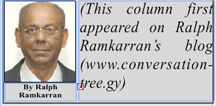A Tripartite Committee, comprising the three political parties represented in the National Assembly, was appointed last year during the Budget controversy and is now revived. There was no agreement in 2012 on anything in relation to the 2012 Budget except for the aborted deal relating to pensions and Linden electricity rates. This unravelled when the AFC, having been left out of the discussions, joined with others and rallied the people of Linden to oppose the hike in rates. The committee then lapsed.
It was not revived for this year’s budget and no discussions took place between the government and the opposition. No one knows the reason why this should be so. It was clear that there would be a stand-off in the National Assembly. Presumably the government figured that with the court ruling in its back pocket and somehow being able to restore the cuts made last year, the Speaker would not dare, the opposition would not dare and it would weather the storm. The Speaker and the opposition had other ideas.
Applying his oft repeated view that the court has no power over the National Assembly, the Speaker ruled that the opposition can reduce the Estimates, not only disapprove them as the Chief Justice had declared. Thus armed, the opposition then administered a blunt surgical knife to the Estimates that slashed in its path several important social and development projects such as the specialty hospital, the airport, GPL, aviation, Amaila and more. There appears to be no consistency behind the cuts, but the opposition had indicated that they would not support projects or expenditures which the government could not justify. They also expressed concern about transparency and accountability.
 The entire Budget fiasco is a reflection of our political culture. When the PNC was in office it gave short shrift to the opposition, consulted perfunctorily and only when required to do so by law, made no other effort to seek opposition support for anything, rigged elections, wrecked the economy, escalated migration and used violence to suppress grievances and democratic aspirations.
The entire Budget fiasco is a reflection of our political culture. When the PNC was in office it gave short shrift to the opposition, consulted perfunctorily and only when required to do so by law, made no other effort to seek opposition support for anything, rigged elections, wrecked the economy, escalated migration and used violence to suppress grievances and democratic aspirations.
Since the PPP/C has been in office it has not sought to involve the opposition in any meaningful way in development issues. There have been programmes such as the National Development Strategy (which has been abandoned), PRSP programmes, constitutional reform, parliamentary reform and a few others in which the opposition has been involved. But the PPP/C has kept its own counsel in relation to serious economic and development issues and has stoutly resisted any serious consultations, even in the National Assembly. Agreements which were forced on the government during times of upheaval have remained unfulfilled.
Our political parties can afford to behave like this because in Guyana ethnicity and not public opinion determines political support. Political parties do not feel compelled to follow a path which may appear rational to observers and the electorate. The government does not believe that refusal to discuss the Budget with the opposition will materially affect its electoral support even if public opinion strongly supports such discussions; and the opposition does not believe that it will lose support if it makes unreasonable cuts which may harm the country’s development and even its own supporters.
When the opposition first requested discussions on the proposed Budget in 2011, the government stood haughtily on ceremony and insisted that it was the duty of the government, not the opposition, to prepare the Budget. It agreed to listen to the views of the opposition but reserved for itself the right to prepare and present the Budget. No serious discussions took place, resulting in large cuts being made. The matter was taken to court by the government which felt that it had secured a favourable ruling and a similar situation could not recur. Hence no discussion took place again for this Budget. The rest is history.
The Budget cuts will harm the economy and the country. They will affect employment and economic growth. They will affect investment by damaging the political climate. The government knows this and so does the opposition. But the fight over the Budget only reflects a larger struggle about the role of the opposition in the new dispensation. The government has offered consultation. The opposition seeks a role in the decision-making process.
It is to be seen whether the government’s decision to engage with the opposition in the Tripartite Committee from July this year for next year’s budget will be actualized. If it is, it is not known whether it will go the way of the previous agreements which remain unfulfilled. If the discussions are serious and constructive it will mean that the government finally realizes that it has no choice but to seriously engage with the opposition.
If the Tripartite Committee will begin discussions on next year’s Budget in July of this year then it can only mean that the Opposition is being given a say in what will be included in the Budget. Otherwise there is no reason for discussions to begin so early. However, the Government has not indicated that it has changed its approach.





